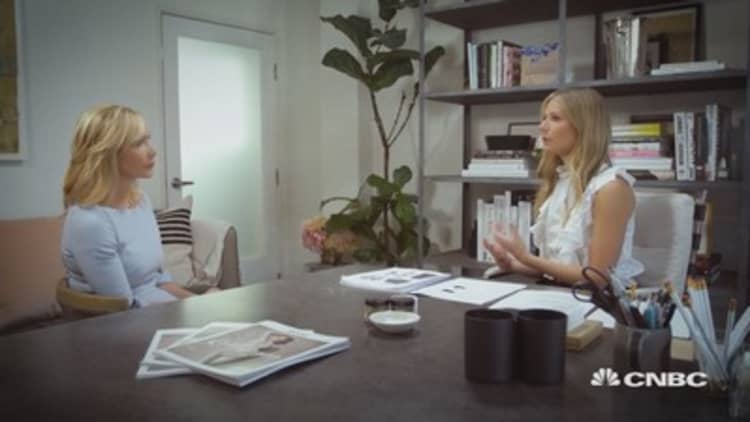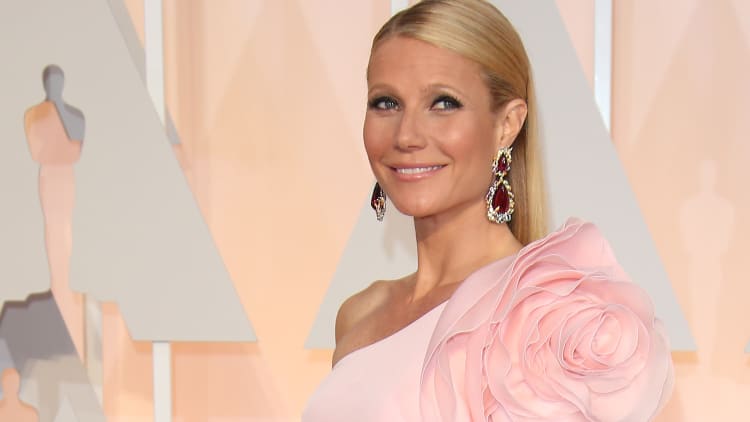In a new series for Netflix, staffers for Gwyneth Paltrow's lifestyle brand Goop dove head-first into the increasingly popular practice of "wellness travel." But this isn't just your typical day at the spa. Instead, staffers flew eight hours to test out the healing properties of psychedelic mushrooms.
And while the health benefits of psychedelic mushrooms, or any fungi containing the drug compound psilocybin, are still very much under debate, you can try out this wellness approach for yourself — that is, if you have a couple thousand dollars to spare.
For the first episode of the all-new series "The Goop Lab," premiering on Netflix on Jan. 24, four Goopers, as the staffers are called, traveled to Jamaica, where the use of psychedelic mushrooms is legal. In the U.S. the possession and cultivation of magic mushrooms is illegal because they contain the chemical compound psilocybin, which is listed in Schedule I of the federal Controlled Substances Act.
"We know at Goop that psychedelic mushrooms are controversial, but what we try to do at Goop is be open-minded and explore ideas that may seem out there or too scary so that people can have access to the information and make up their own minds," Elise Loehnen, Goop's chief content officer, says in the show.
The mission, according to Loehnen, was to "explore psychedelics in a therapeutic setting." The staffers nominated themselves, and all were seeking slightly different outcomes, ranging from self-exploratory to improving mental health. One staffer simply wanted to feel more creative, two Goopers wanted to work on processing some personal trauma and Loehnen, who also went on the retreat, wanted to have a "psycho-spiritual experience."
The episode follows the staffers as they experience the after-effects of drinking a tea containing about 3 grams of psychedelic mushrooms, which are not chemically addictive. Several therapists and psilocybin experts were on-site to help and monitor the staffers, several of which had very emotional experiences while on the drug.
Viewers watch several staffers break down in tears at different points after drinking the mushroom tea, talking out loud to the on-site therapists. Meanwhile, Loehnen experiences uncontrollable giggling, saying "I feel like such a cliche." Yet in the end, several of the staffers note how healing they felt the experience was.
"This is not a typical workplace experience. Although I kind of wonder if it wouldn't be incredibly therapeutic for workplace teams, if you felt really safe and wanted to become even more intimate and connected with the people that you spend the majority of your day with," Loehnen says after the experience.

The practice of taking magic mushrooms remains controversial. It's worth noting, for example, that a 2016 survey fielded by Johns Hopkins researchers and published in the Journal of Psychopharmacology found that of the people who had bad experiences after taking psilocybin mushrooms, 10% felt their "bad trip" put themselves or others in danger. Yet many who experienced the negative side effects of 'shrooms — which can include hallucinations, dizziness, drowsiness, vomiting and paranoia — still said the experience was "meaningful" and "worthwhile."
The episode did not specify which retreat the Goop staff participated in, but there are several operators in Jamaica, and packages range from $1,700, four-day all-inclusive programs with Atman Retreats situated near Montego Bay Lagoon, to a $10,500 luxurious week-long trip with MycoMeditations, based near Treasure Beach in Jamaica.
When you consider that the average American spends about $271 per day on international vacations (or about $1,900 for a week including airfare), the cost of a Jamaican magic mushroom retreat is a bit more expensive than your typical trip.
But in many cases, that extra cost does include some amenities beyond the basics, ranging from group meditation and yoga sessions and vegetarian meals to private beachfront villas and kayaking or snorkeling excursions, as well as extra on-site therapists and doctors to monitor guests while they are experiencing the effects of the mushrooms.
MycoMeditations, in particular, hosts year-round retreats for 12 to 16 people at a time. They have three all-inclusive package levels for seven-day retreats: $4,147 for the Classic package, $5,470 for Comfort level and $10,528 for the Concierge program.
The package includes food and air-conditioned accommodations, as well as access to massages and the beach, but airfare is extra. The cost of the magic mushrooms is billed separately onsite and is an additional $360, plus 16.5% Jamaican sales tax, according to the company.
MycoMeditations starts participants off with a conservative dose of about 3 grams during their initial session. It's provided as a capsule, rather than a tea, to ensure consistent potency, and then that dosage is upped throughout the other two sessions during the week-long retreat.
When looking to book a magic mushroom retreat, Justin Townsend, one of the partners of Mycomeditations, recommends looking very closely at what is included in the total cost, as well as asking about the doses of psilocybin in mushrooms offered. Some programs provide micro-doses (around 0.4 grams), as opposed to the 3 grams or more per session. While micro-doses are less likely to trigger hallucinations, Townsend argues these micro-doses are less helpful for treating mental health issues.
Townsend calls the retreats "totally transformative," adding that he's seen people who have been depressed for 20 or 30 years undergo the psilocybin therapy and see real relief of their symptoms.
Matthew Johnson, an associate professor of psychiatry and one of the Johns Hopkins researchers studying the effects of psilocybin, tells Healthline that while he doesn't recommend people start independently experimenting with psychedelic mushrooms as a healing technique for mental health issues, early studies do show potential benefits for some patients.
"The potential is there for it to transform psychiatry, not just its treatment by our understanding," he says. But he adds that like with any powerful tool, there are "definitely risks."
Don't miss: Gwyneth Paltrow says this wellness practice is 'one of the healthiest things we can do' — and it's free
Like this story? Subscribe to CNBC Make It on YouTube!



